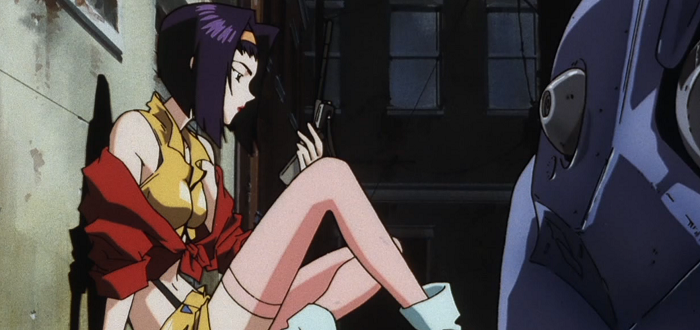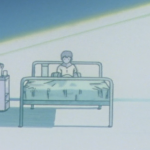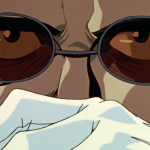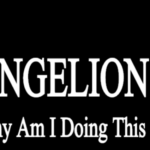Adios, Cowboy: Review 18 – Speak Like A Child
Put me in coach. I’m ready. Dogged and relentless. Let me at ‘em.
I don’t think I need you for this one, pal.
Come on, man. I can cut this one to ribbons.
I know, and that’s why you should take a lap and hit the showers. There’s no challenge to this episode, no purpose beyond a pale attempt at building meaning through a hammy character study. Even in my most insecure student moments, I would never have thought Speak Like A Child was anything other than a cloying attempt to play for sympathy.
The story of Speak Like a Child begins not at the start of this episode, but with the “next time on Cowboy Bebop,” scene at the end of Mushroom Samba. There, a downbeat Jet walks the audience through the tableread notes of an episode he describes as “not very important.” Right, okay, cool. So the show is either leaning into a weak episode, or it’s attempting to lie to the audience.
From where I sit, there is both an art and a science to misdirecting and audience. Also, I feel like we’ve already had this conversation apropos of Cowboy Bebop. To the point at hand, tripping up an audience’s expectations is no small feat. It takes finesse, planning, intention, and caring enough about the audience for the misdirect to serve a larger purpose. At no point during this series have I ever felt like Cowboy Bebop gives a damn about how the audience feels.
Recent events, and even one-offs like Toys in the Attic, make me think Cowboy Bebop exists in service of itself, and anyone who dares to question it gets smoke blown in their face from the ever-cool characters. Now, eighteen episodes in, a show that has its own manifesto, a show that found its early successes in manipulating expectations, is telling the audience that an upcoming episode is “not very important.”
One of two things is happening here: option 1, the episode is very important and the writing is straight-up lying while trying to be cute and clever; option 2, the writing is trying to mess with me because it knows that I know that it knows Speak Like a Child is saccharine. Once again we return to the eternal question of Cowboy Bebop: why?
I ask that question in both a world weary and practical context. Who is the audience for an episode that anchors itself in Japanese creation myths before transforming into lazy montage quest for a Beta deck (as in the thing you played Beta cassettes on in the 1980s)? Who in the audience is meant to be moved by “adult” Faye watching a home movie of herself acting as a cheerleader for her future-self? Let’s review the salient details of this episode’s odd exploration of Betamax nostalgia before I answer that question.
Cowboy Bebop came out in 1998. At the risk of dating myself, I’ll confess to being 17 in 1998. While I did know what Beta tapes were back then, I was also in the AV Club and styled myself as Orson Welles reborn. That notwithstanding, let’s suppose that people +-5 years of my age (i.e. people born between 1976 and 1986) were Cowboy Bebop’s target demographic in the 1990s. Since Sony conceded the cassette wars in 1988, after a decade of growing market share for VHS, I would propose that the target demographic holds no particular romance for the Beta format. By the time I could consume movies of my own volition, VHS was the ubiquitous cassette at the local video store next to the convenience store. Once I graduated to driving to Blockbuster in my 1988 Oldsmobile Cutlass Ciera, VHS tapes were losing ground to DVDs.
As an artefact within the story, Faye’s beta tape, even in 1998, was a throwback to a medium of the 70s and early 80s. In terms of its content, a message to Faye’s future-self, well I’m sorry but it just doesn’t land as anything other than contrived for me. If my math is correct, Faye recorded her self-cheerleading video for her future-self when she was 13. Since my recollection of being a teenager is heavily shaded by self-loathing mixed with pretensions at being too cool for anything, I have a hard time imagining a teenager literally cheering for their future-self on camera and saying things like, “I will always be cheering you on. Cheering for you, my only self. I’m here today and I’ll always be cheering for you. Do your best, do your best, me me me.”
Critic Adam, what does this sound like to you?
It sounds like something a sad middle-aged person would write when they were three whiskeys deep into looking back on their childhood in the late 70s, wondering whatever happened to their wide-eyed youth.
Yeah, that’s pretty much what I think of it as well.
It’s not that I can’t see what the episode is trying to do. This level of overt humanization and character exposition is meant to give Faye an end game for her arc. The audience is meant to connect with Faye while she, simultaneously, connects with a past that was stolen from her. I see it. I get it. I also don’t really care because it is so clumsily executed compared to what we have seen in the past.
Remember four episodes ago when Faye had a nice long chat with Ein about her past? There was vulnerability in that moment. It gave the audience a reason to care about Faye because they could follow their sympathy through her backstory. This episode wraps all that potential in the contrivances of Faye going on a gambling junket because the she thinks that the package containing her Beta cassette might herald the coming of debt collectors.
Even Spike and Jet’s side-quest to Earth amounts to nothing more than giving Faye cause for a mope. Being left behind on Mars might mean something if she didn’t have her own space ship capable of zipping to Earth without much difficulty. The scene also asks the audience to believe that a crew so destitute they could afford neither gas nor fuel one episode ago, now has the coin to burn on roundtrip Mars to Earth hyperspace tolls.
The final insult is when the lads return from a spelunk into an abandoned underground mall with a VHS player instead of a Beta (cue the laugh track about people not knowing the difference between VHS and Beta). There might be some consequence to their blunder if it were not for another literal deus ex machina landing on the Bebop to drop off a Beta deck to play Faye’s tape.
Sorry, Cowboy Bebop, but I know you can do better. You’ve told a story that revolves around technology that was quaint in the 90s and is driven by a vision of youth that seems entirely imaginary. Moreover, a flash of vulnerability in episode 18 doesn’t undo at least a half-dozen episodes were Faye is the literal worst.
The hand of the artist, so to speak, is very visible in Speak Like a Child. It seems intent on pushing a story that is self-reflective, perhaps even a little self-pitying, at a point in the series where conflicts should be coming together not growing ever-more divergent.













